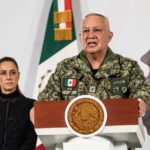
Wayne “Gino” Odjick, 52, who battled his way through a National Hockey League career and fought a debilitating disease for the final years of his life, has died.
Odjick, who played 12 seasons in the NHL for the Vancouver Canucks, New York Islanders, Philadelphia Flyers, and Montreal Canadiens, according to the Montreal Gazette.
Dubbed a “beloved enforcer” by the Montreal Gazette, Odjick passed away Sunday of a heart attack.
“I was there for the whole thing. He had a heart attack, couldn’t recover from it. We knew this day was going to come, we didn’t know when. We were hoping much later,” said his friend Peter Leech, who had gone with Odjick to the clinic where he died.
“Unfortunately that big heart gave out,” he said. “He lived life, we always joked.”
Trending:
So to hear the passing of Gino Odjick, one of the toughest players to play the game. He rode shotgun for Pavel Bure during his time in Vancouver. Godspeed Gino. pic.twitter.com/83zlhZt5aP
— Don Cherry (@CoachsCornerDC) January 16, 2023
Canucks Vice President Stan Smyl recalled Odjick fondly.
“He was a friend to me and to you and to all his fans there in B.C. and throughout North America. He was a very special individual on the ice with what he had to do, but off the ice he was one of the most kindest human beings that I’ve met and played with,” Smyl said.
“He was one of the funniest guys off the ice. He was always joking, always having a laugh in the dressing room. And that’s important to have,” Smyl continued. “If there was some pressure situations, Gino knew when to be able to make everyone laugh and ‘let’s be calm about this. We’ll get it done.’”
“The role that he was as a player is one of the hardest roles to play in hockey. And he handled it very well. It’s a role that you, as a player, know what when you have to be, the tough guy and support your teammates. And he was always there for that,” Smyl said.
If you wanted to see how loved Gino Odjick was by the city of Vancouver. These were well wishers cheering him on outside his hospital room after his AL amyloidosis diagnosis in 2014. Prognosis is between 13-40 months. This was nearly nine years ago. A warrior until the end.💙 pic.twitter.com/wd6BkCSNY9
— Tyler G 🖖 (@Tytanium76G) January 16, 2023
“And he also knew if, when things weren’t going right on the ice or the team wasn’t playing quite up to their caliber that he can go out and stir it up and get the players excited, to get them involved in game and I guess the best way of saying it, he could bring the team into a fight just by being Gino,” he said.
His sister, Dina, wrote it simply on Facebook, saying, “Our hearts are broken. My brother Gino Odjick has left us for the spirit world.”
Odjick fought as a player and as a man. He announced in 2014 that he had been diagnosed with AL amyloidosis, a terminal and rare disease in which the cells that produce antibodies no longer work properly, according to the Montreal Gazette.
At the time, he wrote an open letter to his fans that said, “I feel very fortunate for the support I’ve received over the years. During my career I played in some great NHL cities including Vancouver, Long Island, Philadelphia and Montreal. In my heart, I will always be a Canuck and I have always had a special relationship here with the fans.”
“In my heart, I will always be a Canuck and I have always had a special relationship here with the fans.”
The NHL Alumni Association is heartbroken to learn that Wayne “Gino” Odjick has passed away at the age of 52. pic.twitter.com/cjwWTYXnqN
— NHL Alumni (@NHLAlumni) January 16, 2023
“Gino was a fan favorite from the moment he joined the organization, putting his heart and soul into every shift on and off the ice,” Francesco Aquilini, the Canucks’ chairman and governor said.
“He inspired many and embodied what it means to be a Canuck. Personally, he was a close friend and confidant, someone I could lean on for advice and support. He will be deeply missed,” he said.
Odjick’s mark of 2,127 penalty minutes has not been surpassed in Vancouver’s history.
They don’t make ‘em like Gino Odjick anymore…
And they never will again.
Thanks for all of the memories ❤️#RIP pic.twitter.com/8Ewl4J1RXd
— Bodog (@BodogCA) January 15, 2023
Odjick was born in the Algonquin Nation community of Kitigan Zibi in Quebec, according to NHL.com.
Betty Cahoose, health director of the Ulkatcho Indian Band in Anahim Lake, British Columbia, said for that reason he stood out, according to the Montreal Gazette.
“I always remembered him as being the tough one on the team. It was very exciting and we were very proud because he was First Nations,” she said.






